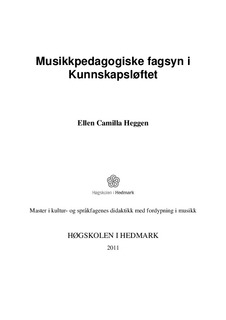Musikkpedagogiske fagsyn i Kunnskapsløftet
Master thesis

Åpne
Permanent lenke
http://hdl.handle.net/11250/132314Utgivelsesdato
2011Metadata
Vis full innførselSammendrag
Norsk: Oppgavens hovedfokus er en tekstanalyse av musikkfagplanen i Kunnskapsløftet. Det
teoretiske bakteppet omfatter estetisk teori, danningsteori og kulturteori.
Problemstillingen er: Hvordan framstår musikkfagplanen i Kunnskapsløftet i lys av de tre
teoretiske perspektivene estetisk teori, danningsteori og kulturteori?
Oppgaven sentreres i stor grad omkring dikotomier, som for eksempel
autonomiestetikk/heteronomiestetikk og sosialisering til/gjennom musikk. Kulturanalysen
åpner for andre tolkninger enn de foregående analysene, da jeg her benytter meg av
dekonstruksjon som forskningsstrategi.
Analysene legger grunnlag for en diskusjon om hvilke musikkpedagogiske fagsyn som
framtrer etter analysen. Dette resulterer i tre didaktiske posisjoner: musikk som estetisk fag,
musikk som kulturfag og musikk som allmenndannende fag.
Det vesentlige ved å se det man er fortrolig med i et nytt lys, er formålet med avhandlingen.
Det teoretiske bakteppet og analysene er en forutsetning for at dette er mulig. Sammen kan
disse kanskje innvirke på pedagogens grunnsyn og forståelseshorisont, og slik bidra til
reviderte oppfatninger og holdninger vedrørende musikkfagplanen i Kunnskapsløftet. English: The main objective of this Master`s thesis is to study the music subject curriculum of the
National Curriculum for Knowledge Promotion in Primary and Secondary Education and
Training (Kunnskapsløftet). The theoretical background consists of aesthetic theory, Bildung
theory and cultural theory.
The research question is: How can one analyze the music curriculum in the perspective of
aesthetic theory, Bildung theory and cultural theory?
The thesis focuses on dichotomies such as autonomy aesthetics/heteronomy aesthetic and
socialization to/socialization through music. The cultural analysis allows for another
interpretation than the aesthetic and Bildung analyses. Here, deconstruction is used as a
research strategy.
The analyses of the study form the basis for a discussion of pedagogical perspectives in music
education, which leads into three possible subject matter didactical positions: music as an
aesthetic subject, music as a cultural subject, and music as liberal education.
To reconsider what elsewhere may appear as familiar is also the aim of the thesis. The
theoretical background and the analyses possibly will allow this re-evaluation to occur. This
might affect fundamental views and understandings of the subject music, and the music
teacher as well, and thus contribute to revised beliefs and attitudes regarding the music subject
curriculum of the National Curriculum for Knowledge Promotion.
Beskrivelse
Mastergradsoppgave i kultur- og språkfagenes didaktikk, fordypning i musikk, Avdeling for lærerutdanning og naturvitenskap, Høgskolen i Hedmark, 2011